Jesus is Our Redemption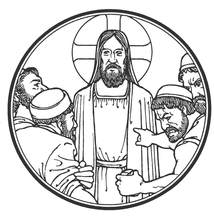
In the temple Jesus said, “If anyone keeps my word, he will never see death” (John 8:51). For Jesus came to taste death for us—to drink the cup of suffering to the dregs in order that we might be released from its power. Clinging to His life-giving words, we are delivered from death’s sting and its eternal judgment. Christ is our High Priest, who entered the Most Holy Place and with His own blood obtained everlasting redemption for His people (Heb. 9:11–15). He is the One who was before Abraham was, and yet is his descendant. He is the promised Son who carries the wood up the mountain for the sacrifice, who is bound and laid upon the altar of the cross. He is the ram who is offered in our place, who is willingly caught in the thicket of our sin, and who wears the crown of thorns upon His head (Gen. 22:1–14). Though Jesus is dishonored by the sons of the devil, He is vindicated by the Father through the cross.
0 Comments
The Lord Feeds His People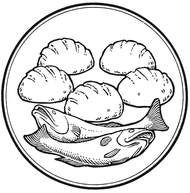
Where do you go when you are weighed down? To the Lord’s house! That is where you are made glad (Introit & Gradual). That is where the Lord is found to be your refreshment and nourishment (First Lesson). That is where the children of promise are nurtured and cared for by their mother (Second Lesson). And that is where the bread of Life is given to you (Gospel). Here in the Lord’s House is where your prayer is heard and answered—where the Lord Himself gives you the comfort of His Grace to mercifully relieve you (Collect).
Historically, the Fourth Sunday in Lent has been called Laetare. “Laetare” is Latin for, “rejoice,” and is the first word in the Historic Introit. This Sunday has been viewed as a sort of respite from the sorrowful season of Lent. This Sunday also marks the halfway point to Good Friday, and is the first time Jerusalem is mentioned in the Divine Service during Lent. We can see the end of Jesus’ time on earth approaching as we near Jerusalem.
Jesus Overcomes the Strong Man
Eyes that are fixed on the Lord are confident that He will have mercy and pull ensnared feet out of the trap (Psalm 25:15,16, Historic Introit). So we look to the Lord, pleading with Him to look on us and “stretch forth the right hand of His majesty to be our defense against all our enemies” (Collect). And in fixing our eyes on Jesus , we also then follow God as dear children, walking in the same love Christ has for us (Epistle). For our confidence is that the Stronger One (Christ) prevails for us against the strong man (Satan), takes away his armor, and saves us from death and hell (Gospel).
The Third Sunday in Lent is also known as Oculi, which, in Latin, means “the eyes,” specifically as in the eyes of faith that we have been given by God for seeing the things that are hidden from the world—the things of God that pertain to our life and salvation, and the things concerning the devil and all his evil ways.
Holding God to His Word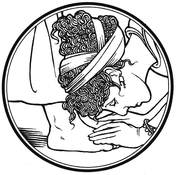
Jacob wrestled with God; he would not let Him go until he received a blessing from Him (Gen. 32:22–32). So it was with the Canaanite woman. Though Jesus seemed to ignore and reject her, she continued to call upon His name and look to Him for help (Mt. 15:21–28). Even when the Lord called her a little dog, she held on to Him in faith and would not let Him wriggle out of His words: “Yes, Lord, yet even the dogs eat the crumbs that fall from their masters’ table.” This Gentile woman shows herself to be a true Israelite, who struggles with God and man in Christ and prevails. “O woman, great is your faith! Be it done for you as you desire” (Mt. 15:27–28). This is the sanctifying will of God (1 Thess. 4:1–7)—to test your faith in order that it may be refined and strengthened. For tribulation produces perseverance; perseverance, character; character, hope. And hope in Christ does not disappoint (Rom. 5:1–5).
Jesus Does Battle In Our Place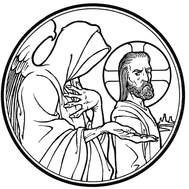
In the Garden, man exalts himself to be a god in place of God (Gen. 3:1–21). He succumbs to the temptation of the devil, and eating of the forbidden fruit, he receives death. But in the sin-cursed wilderness, God humbles Himself to become man in place of man (Mt. 4:1–11). He does not eat but fasts and bears the onslaughts of the devil for us that we may be restored to life. Jesus stands as David in our place to do battle against the Goliath, Satan (1 Samuel 17:40–51). Though outwardly Jesus appears weak, yet He comes in the name of the Lord of hosts. He draws from the five smooth stones of the books of Moses and slings the Word of God. The stone sinks into the forehead, and the enemy falls. In Christ we are victorious over the devil. Let us therefore not receive the grace of God in vain (2 Cor. 6:1–10), but seeing that we have a great High Priest, let us come boldly to the throne of grace, that we may obtain help in time of need (Heb 4:14–16).
The First Sunday in Lent is also known as Invocabit, which, in Latin, means “he will call.” This is the opening phrase of the Introit for the First Sunday in Lent: “He will call on me, and I will answer him” (Psalm 91:15a).
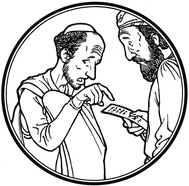 The Day of the Lord is drawing near, and it will be “a day of distress and anguish, a day of ruin and devastation” (Zeph. 1:14, 15). We know that there will be a judgment, a separating of the sheep and the goats, the wheat and the chaff, the righteous and the unrighteous. So listen to the prophet Isaiah this morning: “Stop doing wrong, learn to do right! Seek justice, encourage the oppressed. Defend the cause of the fatherless, plead the case of the widow” (Is. 1:17). Be “good and faithful” stewards of His property (Matt. 25:21). Live by faith in His free gift of forgiveness, and multiply His goods in the loving forgiveness of your neighbor. “The Master of those servants” settles His accounts with them by the gracious reckoning of His Gospel (Matt. 25:19). Likewise, “do not continue to conform to the pattern of this world, but be transformed by the renewal of your mind, so that you test and approve what is the will of God—what is good, pleasing, and perfect” (Rom. 12:2). You can do this because “though your sins are like scarlet, they shall be as white as snow; though they are red as crimson, they shall be like wool” (Is. 1:18). On that day, works and efforts will be for nothing, but those who fear, love and trust in the Lord will be saved.
The persistent widow was determined: she would receive justice, even from a corrupt judge. Her determination kept her begging for justice day after day. In the end she received her due even from a judge with no fear of God and no respect for his fellow man. Learn a lesson in prayerful persistence: How much more will our heavenly Father work justice and bring deliverance to those determined in prayer!
The Ten Commandments always accuse. That is their chief use. They also serve as a rough curb against gross outbreaks of sin. But they also function as the "true fountain" from which all good works must spring. We never have to try to invent or create works to do that are pleasing to God or go beyond what he has given us. In these Ten Commandments we have the guide we need to understand what truly pleases God. Some of Luther's most powerful remarks about the difference between God's Ten Commandments and man-made Church rules are found here. Luther thunders against the pomposity and false teaching that certain "Church works" are better in God's eyes than the simple, humble, lowly works of common life, such as a young girl taking care of a little child. In his Large Catechism, Luther provides a brief summary of the commandments and again shows how the First Commandment is the fountain for all the rest. God has given us a great treasure by giving us the Ten Commandments..
Luther had been married for almost four years when he wrote the Large Catechism. His former life as a monk makes his comments on the Sixth Commandment all the more interesting and powerful. Luther keenly discerns that chastity is not a matter of vowing to live a celibate life, but of honoring God and one's spouse with one's whole being: thoughts, words, and actions. Marriage should be cherished and honored as a divine estate. God created this institution before all others and blessed it above all the rest; and since he brings children into the world through it, he provides all other estates for its support and benefit. Luther condemns forced celibacy within the Roman Church, but recognizes that God does exempt some from married life, either because they are unsuited to it or because they possess the supernatural gift of chastity. For Luther, God intended marriage not only to prevent sin, but also as a means by which husbands and wives love and cherish each other. Marriage is a precious good work far superior to the contrived spiritual estates of monks and nuns.
In his Large Catechism, Luther begins by defining "holy day" and by explaining how by Christ's time the true understanding of the Sabbath had been corrupted. Because the Third Commandment describes Jewish practice int eh Old Testament, Luther plainly states that the external form of this law does not apply to Christians in the New Testament. It is an error to say that Sunday is the New Testament Sabbath. However, the internal form of this command still applies to Christians today. Christians should regularly devote themselves to a day when they can hear and learn God's Word, so that they do not despise it. For this reason Luther commends worship on Sunday for the sake of good order. In this sense, every day for the Christian should be a "holy day" consecrated by God's Word. Luther presents a clever play on words when he suggests there is only one "holy thing." The German word for "holy things" (Heiligtum) was often used to refer to relics, items believed to have belonged to the apostles and other saints. Yet Luther says the only true "holy thing" is God's Word, which consecrates all things and apart from which nothing we do or say is holy.
|
Archives
February 2019
Categories
All
|
||||||||||||||||||||||||||||||||||||||||||||||||||||||||||||

 RSS Feed
RSS Feed
